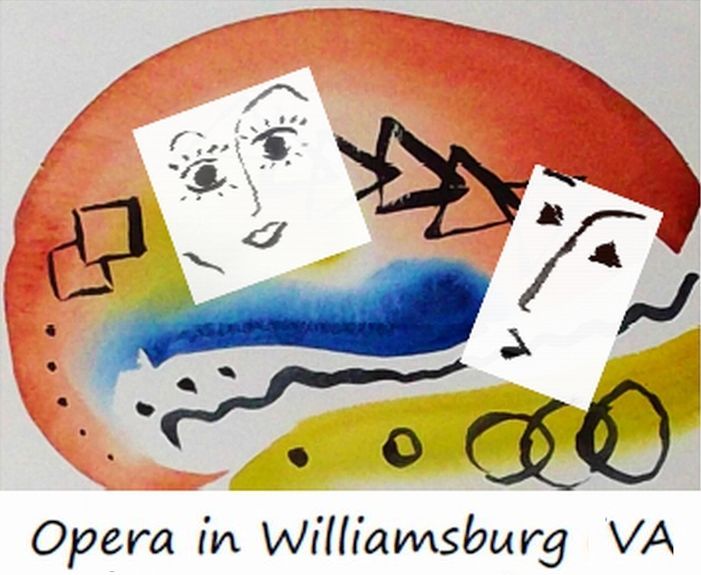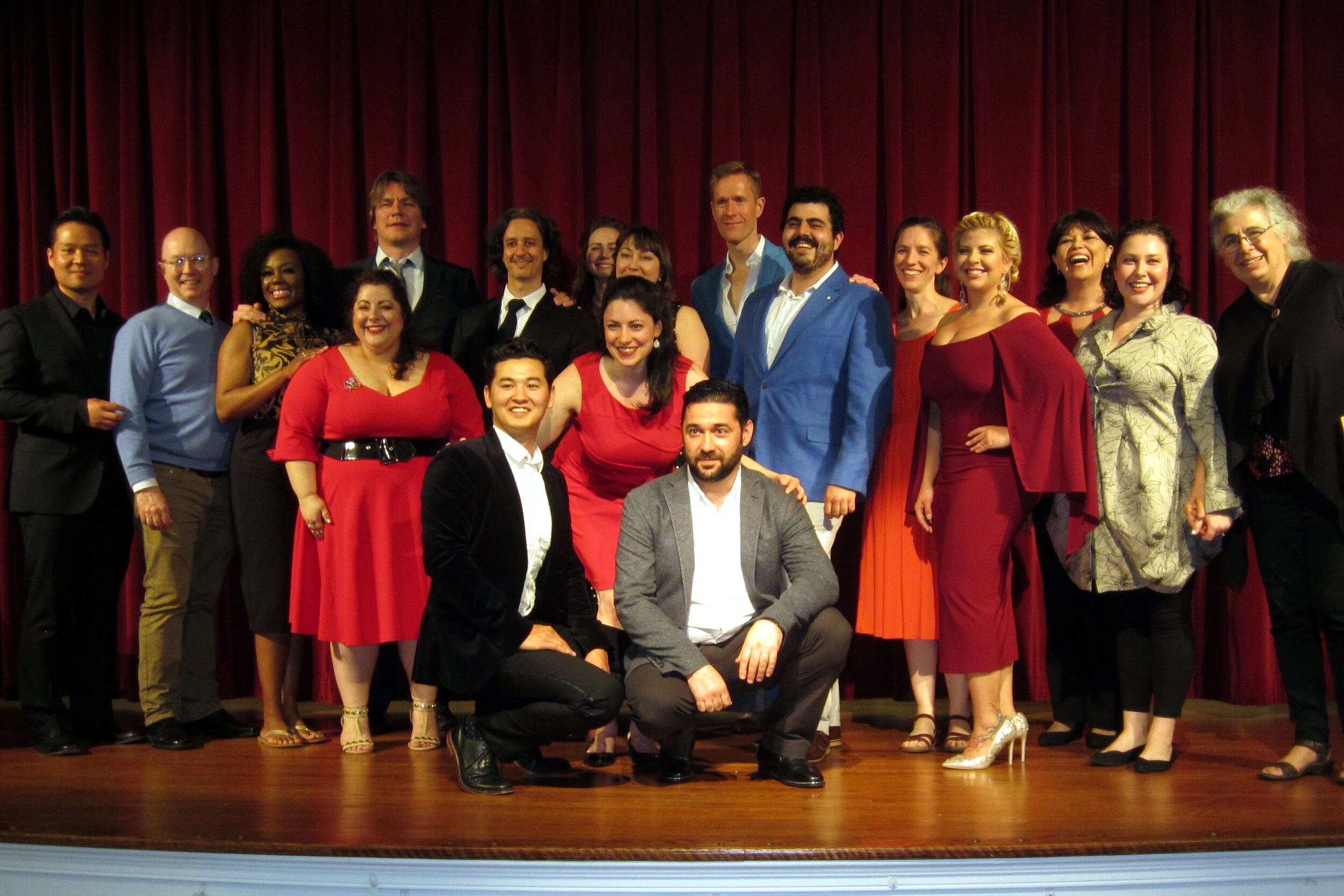The Elixir of Love: Why We Love It
(please see a video recording of the talk at the bottom of this posting)
Gaetano Donizetti -who lived between 1797 and 1848, that is almost exactly the first half of the 1800s- composed almost 70 operas in his career of less than thirty years, an average of two and a half operas per year!
Two of his operas are the most performed operas of the Bel Canto style: Lucia di Lammermoor and L’elisir d’amore (the Elixir of Love).
He was known during his lifetime as a prolific composer, and he was proud of being faster than his contemporary Rossini.
When he heard that Rossini had written The Barber of Seville in two weeks, Donizetti reportedly asked, “What took him so long?”
Donizetti composed Elixir in either two weeks or a month, or even six weeks some people say.
In any case this is an impressive feat considering the length of this opera, the craft and abundance of detail in the vocal and ensemble writing, and the careful and colorful orchestration.
He contracted the services of poet Felipe Romani, the most highly regarded of all Italian librettists of his age, who would write nearly one hundred librettos in his life, including almost all the librettos for Bellini’s operas.
Let’s start by hearing the synopsis retold by the Mexican tenor Rolando Villazon in this delightful cartoon:
All the characters in the Elixir are a charming mix between joyous caricatures and common people. There are no Gods, nor royalty, nor nobility in this opera, and although the characters begin as clear cut stereotypes, as we progress in the opera they morph into verisimilar individuals that are affected by the actions of others.
Donizetti was the greatest tune creator of Italian opera. He excelled at writing little melodies that stick in your ear the first time you hear them, and never go away.
Each melody has an individual quality which makes it memorable.
From the beginning each character is clearly defined musically, and although there’s no use of the leitmotif technique as in Puccini, each melody has a specific personality that matches the character’s emotional reality and the dramatic situation at each point of the opera.
Nemorino first aria is in the simple C major key, an although the mood is overall sweet there are several musical impassioned outbursts and yearning gestures. It opens with a large melodic upward interval to show his excitement and the melody is full of accents in the wrong places to show how upset Nemorino is.
He calls himself an idiot with a simple and chastising melody, to immediately behave musically smitten by Adina’s beauty before repeating himself and pout about his own shortcomings.
IO SON SEMPRE UN IDIOTA
Let me introduce again the Nemorino of our upcoming production of L’elisir, an Opera in Williamsburg favorite and a great friend, Pavel Sulyandziga.
Hi Pasha, welcome to our talk. Tell me what is your history with Elixir?
And how do you feel about Nemorino?
Adina first aria is an ensemble piece in which she reads the story of another famous Elixir of Love, the one from the legend of Tristan and Isolde. I always think it’s fun when there’s a reference in an opera about another opera, although in this case the reference came afterwards, since Wagner’s opera came thirty years later.
She is clearly more educated than most of the townsfolk, and as Nemorino said in his first aria, she reads, studies and learns. Her first theme is a gentle and charming waltz, and then she introduces the musical theme for the Elxir: “I wish I knew whoever knew who made such perfect elixir!”
Here is the waltz:
DELLA CRUDELE ISOTTA (Adina’s Waltz)
And here is what I call the Elixir Anthem:
ELIXIR ANTHEM
Then the proud Belcore appears. He is a soldier but he is educated, in fact he is making references to the Judgment of Paris when he flirts with Adina. His music is showy, his vocal swagger is a clear manifestation of his confidence and pride. He says, in a wonderful line of Romani’s libretto: “I see clearly in your eyes that I have breached your heart. It’s not surprising: I’m gallant, and I’m a sergeant!”
Here is this line from Belcore:
BELCORE
The last main character is the “Doctor” Dulcamara. He is what is considered a basso buffo, with comedic musical behaviors like patter songs with simple melodies of repeated notes. He makes a grand entrance after the trumpet announces his coming. The trumpet introduces the melody that later he will use to sing about his elixir.
DULCAMARA TRUMPET CALL
He is a charlatan so he talks a lot: while Nemorino’s arias have 8 lines in the libretto, and Adina and Belcore each have 16 lines, Dulcamara has 72!
Elixir has beautiful arias but also have outstanding ensembles, duos, trios, quartets that build in excitement from individual and expressive statements to quick and flashy full company numbers.
One of my favorites is the beginning of the Act I finale. It starts with a solo for Nemorino, and he is soon joined in a feisty duet by Adina, that becomes a trio with Belcore, and then a quartet with Gianetta (Adina’s friend) to close Act I with the participation of the regiment and whole town.
The scene starts with a monologue of Nemorino getting the first dose of the elixir (nothing else but a bottle of Bordeaux), Adina walks in and notice he is confident and dismissive, which does not make her happy.
Eventually Belcore arrives and Adina, out of spite, decides to accept his marriage proposal and set the wedding for the following week.
Nemorino, confident that the Elisir will work its magic the following day, laugh away at them.
Here is the duo and trio from Act I, performed by Pavel Sulyandziga, our Nemorino, Kinneret Ely, and Suchan Kim, all Opera in Williamsburg favorites, in ca recording of a recital this past February in Israel — you can set your video to show subtitles:
Donizetti’s music flows from the words more directly than was the case with Rossini or Bellini. In his greatest moments, Donizetti exploited music’s ability to add meaning to text like few other composer in the history of music.
Let me use an aria from his last comedy to illustrate his genius at economically portray ideas and feelings with just a few notes, in a way that is so natural and organic that is never self evident yet strongly clear.
Here is Norina’s introductory aria from the opera Don Pasquale.
Norina is reading a novel about chivalry love. After reading a passage aloud, she confess that she also is well versed in the art of tricking and ensnaring men.
There are constant examples of word painting: conquered by love, swear, knight. Here is a Taste of Heaven:
PARADISO
Even her laughing is scored: here’s a chuckle
CHUCKLE
And the first section will end with an outburst of laughter.
Then my favorite moment: Donizetti writes little fast notes that become a musical gesture for several ideas: I know, Magical Virtue, Burning Heart, Small Smile, Deceiving Tear. Even the concepts of ‘at the right time and place’ and ‘slow fire’ and indicated by a slowing down on those moments:
SO ANCH’IO
These are just some examples of Donizetti’s ease at creating music that enhance the meaning and dramatic content of the text.
Before we hear the aria sung live, let me introduce April Martin, who will play Adina in our upcoming production of Elixir. You may remember her as our charming First Spirit from our production of Die Zauberflöte a year ago. Welcome April!
What is your history with L’elisir, when did you hear it for the first time?
And how do you feel about Adina? She is certainly not your typical girl:
Let’s hear our Adina singing Norina’s aria from Donizetti’s Don Pasquale
I would like to talk now about one of the hits form Elixir and perhaps it most well known moment, the aria Una Furtiva Lacrima.
Donizetti asked Romani to include an aria for Nemorino at this late moment in the opera, to add a balance of human poignancy to the comic spirit of the work, and Romani presented him with one of the best crafted lyrics in the repertoire.
Then Donizetti made his magic with wonderful touches of musical psychology and word painting:
the bittersweet pathos of the moment is draw by alternating minor (sad) keys with major (happy) keys;
the use of the harp for the first and only time in the opera, to create a warm and fragile background;
the great burst of sunshine in G major that comes when Nemorino finally realizes that Adina does love him: “M’ama, si, m’ama, lo vedo!” (She loves me, yes, she loves me, I see it!).
Here is Pasha again singing Una Furtiva, from the same recital during a recital tour to several cities in Israel organized by Naama last February.
Thank you so much and remember our next free Opera At Home event: A conversation with our singers: Sunday June 7 at 2:30 PM, hosted by Naama and featuring Kearstin Piper Brown, Suchan Kim, Eric and Jenny Lindsey, and more.
Thank you so much!

